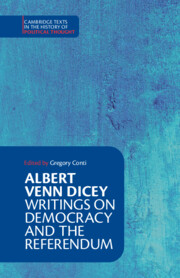Book contents
- Frontmatter
- Contents
- Acknowledgements
- Introduction
- Chronology
- Note on the Texts
- Bibliographical Note
- Political Writings
- 1 The Balance of Classes (1867)
- 2 Democracy in Switzerland (1890)
- 3 Ought the Referendum to Be Introduced into England? (1890)
- 4 The Defence of the Union (1892)
- 5 The Referendum (1894)
- 6 Will the Form of Parliamentary Government Be Permanent? (1899)
- 7 The Referendum and Its Critics (1910)
- 8 The Parliament Act, 1911, and the Destruction of All Constitutional Safeguards (1912)
- 9 Development during the Last Thirty Years of New Constitutional Ideas (Extract from the Introduction to the Eighth Edition of Introduction to the Study of the Law of the Constitution, 1915)
- Index
- Cambridge Texts in the History of Political Thought
1 - The Balance of Classes (1867)
from Political Writings
Published online by Cambridge University Press: 10 February 2023
- Frontmatter
- Contents
- Acknowledgements
- Introduction
- Chronology
- Note on the Texts
- Bibliographical Note
- Political Writings
- 1 The Balance of Classes (1867)
- 2 Democracy in Switzerland (1890)
- 3 Ought the Referendum to Be Introduced into England? (1890)
- 4 The Defence of the Union (1892)
- 5 The Referendum (1894)
- 6 Will the Form of Parliamentary Government Be Permanent? (1899)
- 7 The Referendum and Its Critics (1910)
- 8 The Parliament Act, 1911, and the Destruction of All Constitutional Safeguards (1912)
- 9 Development during the Last Thirty Years of New Constitutional Ideas (Extract from the Introduction to the Eighth Edition of Introduction to the Study of the Law of the Constitution, 1915)
- Index
- Cambridge Texts in the History of Political Thought
Summary
The constitutional lawyer and public intellectual Albert Venn Dicey remains a touchstone for scholars in constitutional/public law, who return to his classic definitions of the rule of law and of parliamentary sovereignty. Likewise, British and Irish historians have kept him in view, assessing his role in the conflict over Home Rule that dominated the politics of the period. Nevertheless, Dicey has been overlooked as a political theorist. This oversight impairs our understanding of the development of liberal and democratic thought, and deprives us of valuable insights at a time when the compatibility of democracy and liberalism has again been put in question both within academia and in broader public discourse. Specifically, it has been too little noted that Dicey was the earliest Anglophone thinker to put advocacy of the referendum at the heart of a sophisticated theory of democracy. He diagnosed modern Western parliamentary regimes as suffering from a crisis of representation, which he wished to remedy by implementing a specific form of constitutional referendum. This chapter is one of Dicey’s major explorations of the referendum and the trajectory of democracy.
Keywords
- Type
- Chapter
- Information
- Publisher: Cambridge University PressPrint publication year: 2023

